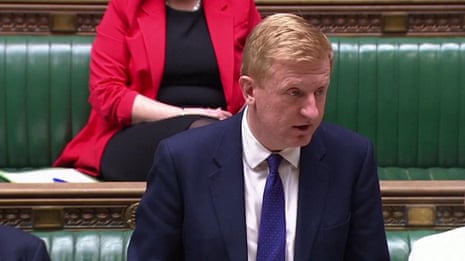Ministers summoned a senior Chinese diplomat to the Foreign Office on Tuesday after accusing Beijing-backed hackers of a cyberattack on Britain’s election watchdog and a surveillance operation on politicians.
The ministry called in the Chinese chargé d’affaires and told him that Britain would not tolerate “threatening” cyber attacks.
A spokesperson for the FCDO said the department has “expressed the government’s unequivocal condemnation of Chinese state-linked organizations and individuals engaging in malicious cyber activity against UK democratic institutions and parliamentarians”.
“The UK government would not tolerate such threatening activity and would continue to take strong action, together with partners around the world, to respond,” they said.
The summons came after Deputy Prime Minister Oliver Dowden announced sanctions on Monday against a company and two individuals accused of involvement in China’s malicious cyber activities.
But the ministers were criticized by Tory MPs including Robert Jenrick, the former immigration secretary, and Alicia Kearns, the chair of the foreign affairs select committee, who called the government’s actions “weak” and “insufficient”.
Rishi Sunak defended his approach to China, insisting that Britain is “arguably more robust than most of our allies”. Liaison committee MPs challenged him on the government’s unwillingness to act against Chinese-owned companies such as ByteDance, owner of TikTok.
The Prime Minister told MPs that Britain had introduced stricter export controls on sensitive technologies and a stricter foreign investment program than other countries. “In terms of trade, we are already less dependent on China for our trade than Australia, Korea, Japan, the US, Germany and many other countries,” he said.
“I am confident that our approach to dealing with the risk posed by China is very much in line with that of our allies and in most cases goes further in protecting ourselves.”
Sunak also cited the government’s decision to remove Huawei equipment from Britain’s telecommunications networks, which Boris Johnson took in 2020 after a major rebellion from Tory backbenchers.
Dowden indicated Tuesday that the administration was preparing to place China in the enhanced tier of the administration’s new foreign influence registration program. This would require organizations or individuals to register with the government if they conduct advocacy or campaign activities on behalf of Beijing.
The Prime Minister’s spokesman said the plan was “in its final stages and no countries have been specified yet.”
after newsletter promotion
Dowden told MPs on Monday that ministers were “working on a collective government agreement” on the issue and that “the behavior I have described today will have a very strong influence on the decision we make on this”.
Ministers are also under pressure to formally label China as a threat to British security in the government’s integrated review, which sets out the country’s foreign, defense and security policy. Currently, China is described as an “epoch-defining challenge”.
Education Secretary Gillian Keegan told Times Radio that China was “clearly a threat to security”.
There are differing views within the government on how robust a approach should be against China, one of Britain’s largest trading partners.
The sanctions announced on Monday were part of a joint move by Britain and its allies to expose the extent of China’s cyber espionage activities, with the US indicting seven alleged Chinese hackers.

